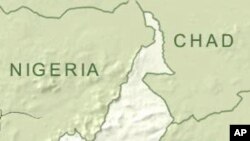Three journalists and a university lecturer in Cameroon are on trial for going on television to discuss a corruption case involving the purchase of a presidential plane.
The four men are charged with "public discussion of a judicial process still in progress" in connection with their appearance on the private television station Canal 2 International last June.
Journalists Anani Rabier Bindji, Alex Gustave Azebaze, and Thierry Ngogang were joined by university lecturer Manassé Aboya Endong in a discussion of the ongoing anti-corruption crackdown code-named Operation Sparrow Hawk.
In criticizing that program as an overly-political operation that they say is being used by the president's political allies to intimidate opponents, the men cited documents relating to the 2004 purchase of a presidential jet.
The former general manager of Cameroon Airlines Yves Michel Fotso is under investigation for his role in that purchase and has had his passport confiscated by police pending the outcome of their inquiry.
Fotso called a news conference to discuss the case against him. And that is where Anani Rabier Bindji says reporters learned the information included in last year's television program.
Bindji says the state prosecutor is accusing him and his co-defendants of releasing confidential information to influence an ongoing investigation. But Bindji says the person who is involved in that investigation is the one who disclosed that information to the media after being questioned by police.
Bindji says the only difference is that he says Fotso was not telling the truth when he called the media. Bindji says the documents they received were not marked confidential and were given to them in their offices. He says it is not as if they broke into a police station and took them.
The men face up to three years in prison and fines of up to $10,000 if convicted.
The International Federation of Journalists says the charges against them are an effort to stifle independent investigations into corruption in Cameroon. Instead, it says President Paul Biya's government should be consolidating press freedoms and freedoms of expression fundamental to democracy.
Journalists in Cameroon on Trial for Discussing Corruption Case

Anani Rabier Bindji, Alex Gustave Azebaze, and Thierry Ngogang and university lecturer Manassé Aboya are charged with 'public discussion of a judicial process still in progress'










